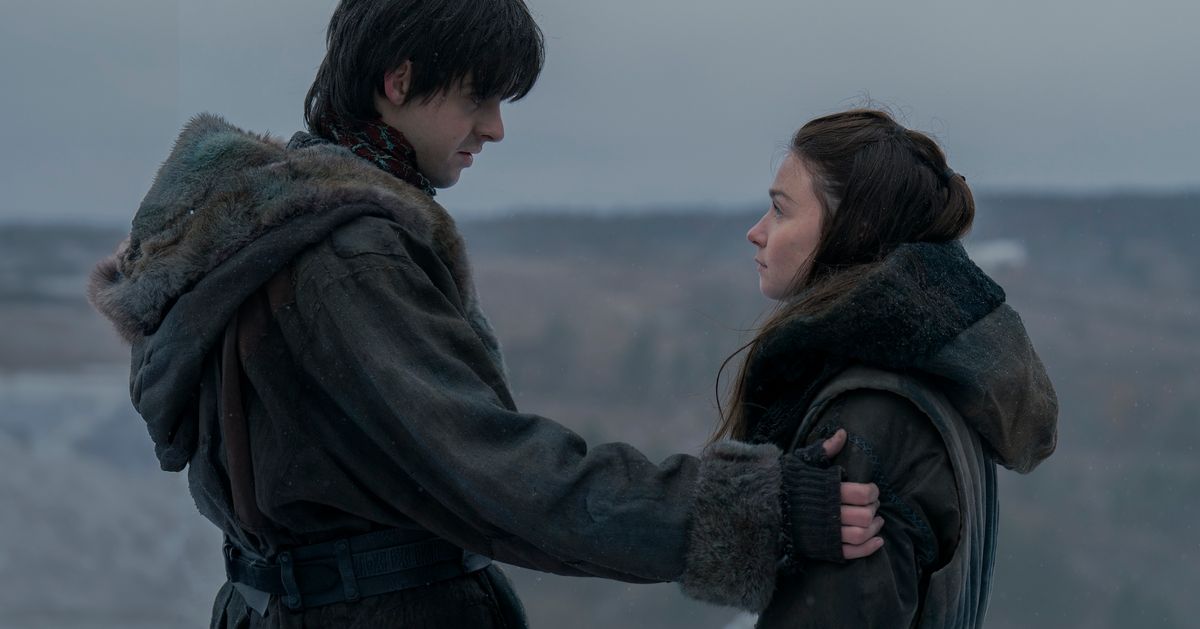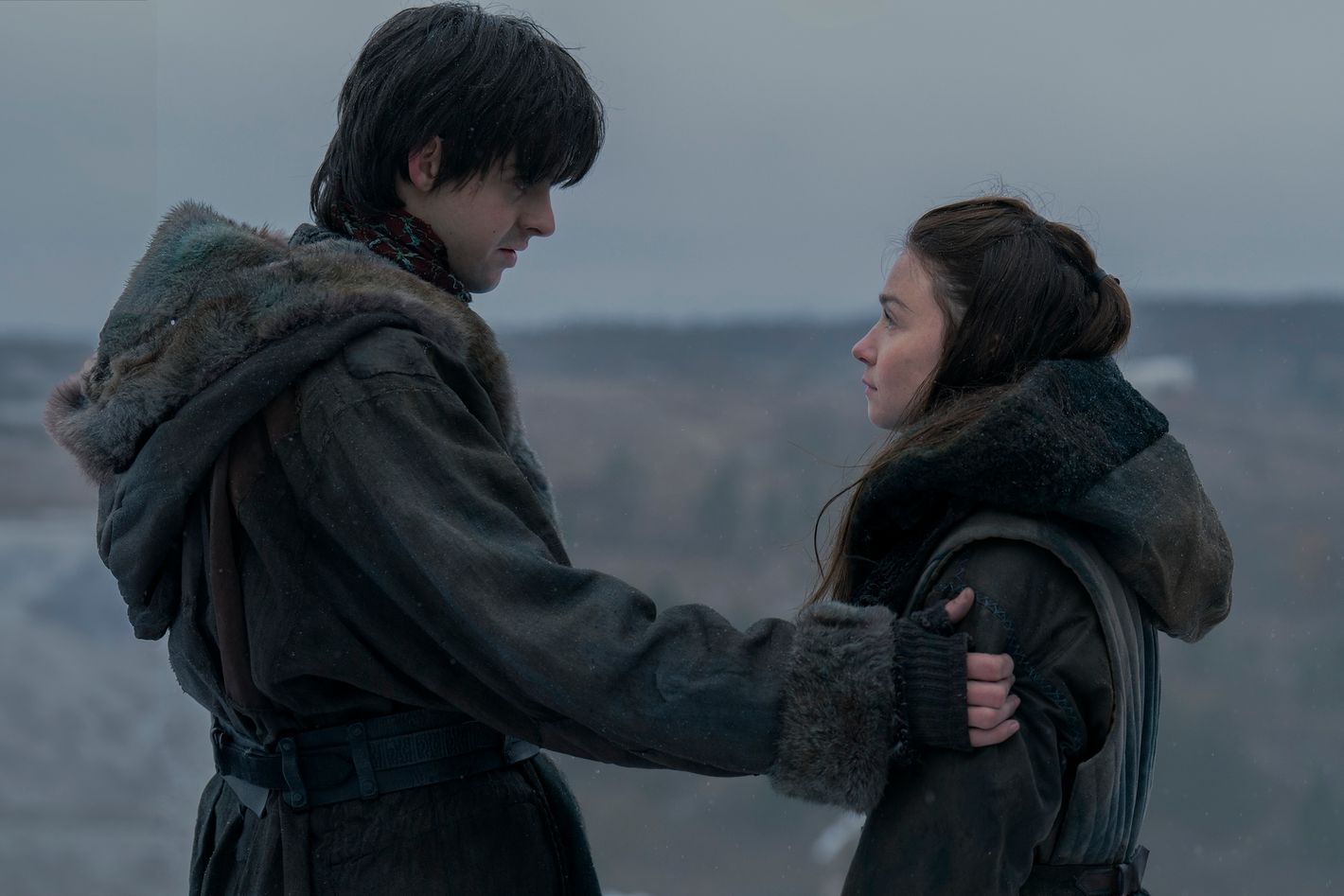Dune: Prophecy Recap: A Harkonnen Never Forgets
Wait, so this 10,000-year plan to genetically engineer a messiah was just a revenge plot all along?


Now that’s more like it.
At the risk of sounding like the person who begs their friends to hang with a show that gets off to a clunky, purposeless start, the third episode of Dune: Prophecy goes a long way toward solving the problems with the first two — one of which labors under the gruntwork of science-fiction world-building and the other of which whips up palace intrigue seemingly to no thematic end. Right away, the show seemed destined to confine itself to a footnote in the larger project of Dune movies, novels, and spinoffs of novels rather than something more distinctive than mere brand extension. And it still can’t quite be trusted, either, not to fall back into bad habits.
Yet “Sisterhood Above All,” a title that itself bears multiple interpretations, snaps Dune: Prophecy into focus by suggesting the true nature of a millennia-long project in human engineering. Through an extensive series of flashbacks that illuminate Valya and Tula Harkonnen’s past and their current leadership positions within the Bene Gesserit, the series starts to question the independent mission of the Sisterhood by outlining the ulterior mission of a sisterhood rooted in tragedy and now manifesting in revenge. The ostensible mission of the Bene Gesserit under Mother Superior Raquella is to assert a kind of benevolent influence on the leaders of the Imperium, sending Truthsayers to help protect them from poisonous lies and manipulating genetic bloodlines to achieve long-term goals.
The notion that this would pay off 10,000 years later in Paul Atreides would seem to point to the Sisterhood’s discipline and focus throughout multiple generations, which flies in the face of the notion of human fallibility. But let’s remember that Paul Atreides is a deeply problematic and dangerous Chosen One type, possessing a messianic power that frightens him and, in all likelihood, leads to a bloody jihad of unimaginable proportions. What “Sisterhood Above All” begins to outline is the fitfully dark origin story, one where the Bene Gesserit leaders are truly representatives of House Harkonnen, driven not by an optimal vision of the universe but by the eternal quest for revenge that will turn their successors into rich, vile, self-indulgent mutants. (This is where you have to give the nod to David Lynch’s Dune over the Villeneuve movies: His Harkonnens, led by Kenneth McMillan as Baron Vladimir Harkonnen, are a truly disgusting lot.)
Last week represented a huge, possibility existential humbling for Valya Harkonnen, who’s exiled from Emperor Corrino’s palace after losing a battle of influence and will with Corrino’s psychokinetic soldier, Desmond Hart. “Like the others, this soldier will learn,” she hisses, but Valya recognizes that the Bene Gesserit could wane quickly if the bad buzz spread to the other Great Houses. Meanwhile, her sister, Tula, is back on Wallach IX, standing over the body of a promising acolyte, Lila, who has not regained consciousness after going through the Agony and meeting with a hostile reception on the other side. Valya had been hasty to put Lila through the Agony without the necessary training, and now the Harkonnens are both under scrutiny for sacrificing an acolyte so recklessly.
But the episode doesn’t continue moving forward in the timeline. Instead, it flashes back meaningfully to Valya and Tula’s youths on Lankiveil, a frostbitten tundra of a planet where the Harkonnens live among hearty simpletons who live off the whale meat and fur that’s also their chief export. They are the scapegoats of the Imperium at this point, not the power players, and their status has been lowered by a history that celebrates the victories of Vorian Atreides over the thinking machines while denigrating the Harkonnens as cowards. In defiance of her parents, who have resigned themselves to life on Lankiveil, Valya condemns their “complacency” and declares that if they don’t take action, “it will infect all of us and all who come after us.” Her brother, Griffin, the family favorite, agrees to take up the fight with her. One brutal, exceptionally effective cut later, Griffin is dead.
From there, “Sisterhood Above All” follows young Valya and Tula down parallel tracks, teasing our assumption that Valya is always leading her weaker, less decisive sister into the muck with her. After all, we had just seen Tula express her objection to putting Lila, an acolyte she treated like a daughter, through the Agony and getting overruled by Valya, who seemed to have little faith in her. However, the two turn out to have a common ruthlessness, despite Tula’s empathy reading as a lack of resolve. That is most emphatically not where the episode leaves her, but let’s not get ahead of ourselves.
Young Valya sees the Bene Gesserit as a necessary pathway to power, where she can defy the lies of history by sowing the seeds of prophecy. In a crucial scene with her fellow acolytes, Valya questions the Sisterhoods’ primary purpose as Truthsayers, which her instructor assures can be used to “exert a subtle influence, call humanity to its better nature.” But Valya recoils from that rosy assumption about human nature: “Just because the leaders are told,” she retorts, “it doesn’t mean they’ll use [the truth] to good ends. Truth is a tool.” That’s the fundamental schism that separates Valya from Dorotea in their mutual quest to succeed Raquella, and, of course, she revolves that struggle with an act of shocking violence. So much for humanity’s better nature.
Meanwhile, in the present, Tula cannot bring herself to take Lila off life support, even though she quietly insists that she’ll do the difficult thing when the time is right. This prompts another flashback where she’s in a romantic relationship with a strapping young man named Orry, who wants to introduce her to his family. In a heavy bit of foreshadowing, young Tula shows Orry’s younger brother how to bait a lure to capture a particularly elusive bull in the forest, saying, “True strength is not always something you see from the outside.” (Hint, hint, hint!) She also reveals a small animal sac containing a poison strong enough to fell a human. (Hint, hint, hint!) As his family revels outside by a bonfire, Orry proposes to Tula, and she responds so warmly that the cries of “Atriedes! Atreides!” from outside their tent seems like a Montague and Capulet situation for the pair. The next morning, however, Orry discovers Tula has poisoned his entire family — save for his brother — and has a dagger left over for him.
The chilling yet intriguing aspect of young Tula’s actions is that she really did seem to like Orry. She had just made the hard decision of choosing her family over him. She’s genuinely more empathetic than Valya, but just as capable of ruthlessness and subterfuge. The two threads come together over a “secret” that Raquella shares with young Valya — but not yet with us — after Valya staunchly refuses to take the sisterhood vow along with the other acolytes. It’s important to know that Raquella seeing Valya’s defiance as a strength rather than a disqualification means that she probably favored Valya over Dorotea to lead the Bene Gesserit into the future. Because what we discover later, when Tula has presumably laid Lila to rest, is that Raquella was hiding a massive, forbidden thinking machine in secret. Now Tula has taken Lila back to this machine in the hopes of resuscitating her.
And so, Dune: Prophecy now moves forward with the exciting truth that the Bene Gesserit is not an independent force to guide the universe down a more enlightened path, but a political organization tainted by the Harkonnens’ age-old beef. These sisters are trying to bring the Sisters along with them.
Kwisatz Haderachs
• We’re not going to get an origin story to the origin story, but Valya’s early use of the Voice to guide her brother, Griffin, out of the ice as a child suggests a hero’s destiny every bit as much as the genetic gifts bestowed upon Paul Atreides.
• Tula insisting on using the poison to put Orry’s horse out of its misery rather than a blunter object hints at the subtlety that separates her from the megaphone-loud blasts of her sister’s voice. She may also be more capable of mercy.
• Young Valya deploying the Voice on her bunkmates (“Face her; slap her”) is a taken like a great party trick.
• Sister Jen’s own defiant streak is worth monitoring since she’s the only acolyte to call out Tula for taking advantage of Lila’s desire to know her origins in order to cajole her into doing the ritual that killed her. The Harkonnen sisters will surely not be alone in trying to steer the Bene Gesserit’s future.
• Valya’s elderly father may not be happy to see her, but it’s telling that she visits him atop a comfortable high-rise rather than the icy backwater of Lankiveil.








